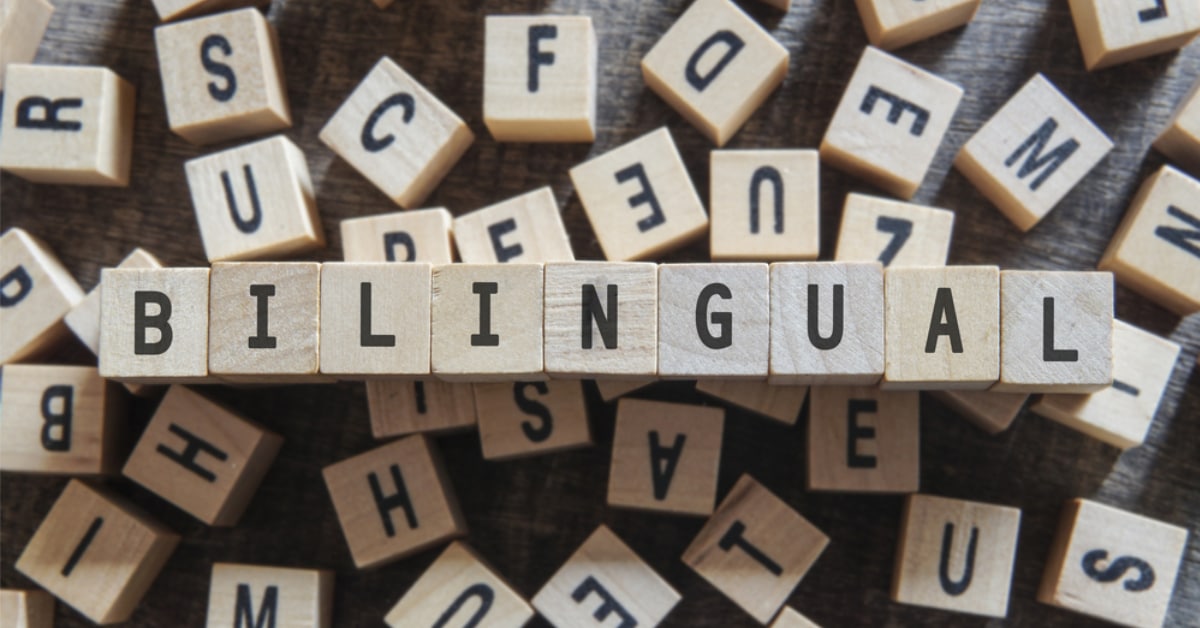Oh, to be bilingual! That is what many people dream of. We’ve all heard people say that it brings many new opportunities to your life. And, let’s be honest, the idea of knowing another language sounds so cool!
But do you know what bilingualism really means? Does it imply speaking and reading in another language? Do you know the differences between bilingualism, multilingualism and polyglot? In this blog we explain all of this to you.
Bilingual or Biliterate?
Being bilingual means that you speak two languages fluently. Maybe you learned both languages at the same time, or you studied a second one after mastering your native language. It doesn’t matter how you acquired them; if you speak them, you’re bilingual.
When we meet a bilingual person, we assume they know how to read and write in both languages. That’s not always the case. Someone might speak two languages, but not know how to read and write in one (or both) of them.
The knowledge of knowing how to read and write in two languages is known as biliteracy.
So, bilingualism and biliteracy complement each other in any language journey. This way the language learner can master the different language skills that exist. That’s why many schools’ dual language programs will tell you that their focus is on making your kids both bilingual and biliterate.
Differences Between Bilingualism, Multilingual, and Polyglot
There are many words to express the idea of knowing another language. You have to know the differences if you want others to know your real amount of language expertise. For example, if you put on your resume that you’re a polyglot and you only know two languages, you might create confusion. And this might be counterproductive. It would be better to write that you’re bilingual.
Honestly, it’s not that hard to differentiate between these common language words. Multilingual means that you speak more than two languages. A polyglot is also someone who speaks many different languages.
5 Benefits of Being Bilingual
Being bilingual it’s not just cool, it also comes with many different benefits and life opportunities. So next time you think about learning a new language or about giving your kids a bilingual education, don’t hesitate. Do it!
1. Studying Abroad
And if you want to have a bicultural college experience, the best way to do it is by studying abroad. Many colleges and universities offer exchange programs. These are a great way to expand your education. You’ll keep learning about your major, and mastering your second language while getting to know another culture.
You can even put this on your resume when you apply to a job. It’s always impressive.
2. Job Opportunities
We live in a globalized world. That’s why many companies are already asking for many of their employees to know at least two languages. No matter your profession, if you are bilingual, you’ll be able to help the company you’re applying for to reach international audiences. And if you can do that, they’ll most likely want you on their team.
Even if the job you’re applying to doesn’t require a second language, it will give you bonus points.
Imagine getting a raise and being asked to move abroad to represent your company in another country. If your boss likes your work, that’s a possibility. And being bilingual will increase your chances of achieving this. So, what are you waiting for? Go learn a second language.
3. Traveling and Living Abroad
You can travel without knowing another language. There are some tools you can use to communicate and move around the country you’re visiting. But, it’s always better when you know the local language.
That way you can fully immerse yourself in the culture because languages are part of a country’s culture. You could speak to the native people, and learn about their traditions. Or see how they express themselves on a daily basis. You could even understand their jokes, and have a good time with them.
Plus, what if you have the chance to stay and live there indefinitely? Maybe you do it for fun, but you’ll still need a job. Knowing their language will help you find one more easily. Or maybe you are living there as an expatriate. Then knowing the language will help you make friends, and have an overall better international experience.
4. Delays Alzheimer’s Disease
Bilingualism has many cognitive benefits too. It helps delay Alzheimer’s disease. And even with Alzheimer’s patients, bilingualism helps them with their symptoms. In a study where both bilingual and monolingual people with dementia were scanned, the bilingual patients, who were older than the monolingual ones, had more connections among different brain areas. This helped them delay the symptoms. Therefore, bilingualism helps people live longer and better lives.
5. Helps You Learn More Languages
That’s right, bilingualism helps you increase your language knowledge. So, if you want to become a polyglot, you might find it easier. Learning a language is not an easy path for everyone. But if you already know one, then that experience with second language learning will help you pick up more languages.
First, your brain already knows what it takes to learn a new language. You’ve already developed the skills necessary for this.
Second, you already know what works best for you; which routines and ways of studying help you focus more. Perhaps – apart from going to class – watching international films help you gain vocabulary, or listening to music helps to improve your listening skills.
Even if you acquired your second language almost on par with your first language, you can use your studying skills in general. You’ve gone to school; you’ve passed many subjects; apply what worked for you there into your language learning process.
How to Become Bilingual
As you’ve seen, being bilingual means more than speaking a second language. It means increasing your life opportunities and developing cognitive skills. But how can you become bilingual?
Nowadays there are many language apps that promise to help you learn a new language. And though you can use them as a practice tool, they won’t make you fluent. You can also use other language practice tools, like listening to podcasts, reading books, or taking online tests.
But if you really want to be bilingual and improve your language proficiency, you should take conversational language classes – not just at any old school either. And even then, you should be careful, because most schools focus on reading rather than speaking.
If you want to take classes whose main focus is on speaking, check out TruFluency’s customized language coaching. Our fluency sessions are based on the Bellieu Method, created to make you TRUly fluent in another language. And since all of our sessions are online, you can take them from anywhere around the world.
Best of all? Our language tutors are native speakers! Almost all of the session time will be in your target language, and you’ll learn idioms and useful vocabulary.
We’ll help you become bilingual. Or even achieve polyglot status! Subscribe and get 20% off of your first month of classes with code TF20.





